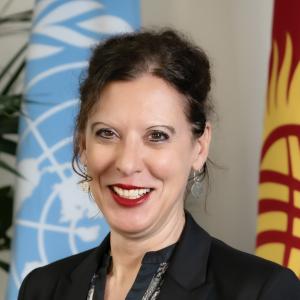Opening Statement by UN Resident Coordinator: Mountain Agenda Meeting with the diplomatic missions and international organizations in the Kyrgyz Republic.
Mountain Agenda meeting with the diplomatic missions and international organizations in the Kyrgyz Republic. 22 November, 2023, Sheraton Hotel, Bishkek.
Deputy Minister of the Foreign Affairs, Mr Moldogaziev,
Special Envoy Mr. Aitmurzaev Nurlan Tashmurzaevich,
Excellencies,
Development partners, Dear UN Colleagues,
Good morning!
I welcome you to this event dedicated to an update on the work towards the implementation of the Five Years Action for Sustainable Mountain Development, which was adopted through a Resolution of the UN General Assembly a little less than a year ago.
Today’s meeting is taking place at an important time – with the United Nations Climate Change Conference - COP 28 – around the corner, and the UN’s synthesis report on Nationally Determined Contributions published a few days ago. The Report provides yet more evidence that the world remains massively off track to limiting global warming to 1.5 degrees Celsius and avoiding the worst of the climate catastrophe. Importantly, for the first time, upon the initiative of Andorra, with strong support from Kyrgyzstan, COP 28 will see a dedicated discussion of the impact of climate change on mountainous regions and people, as well as a special event on Mountains and Climate Change organized in conjunction with the Mountain Partnership.
For Kyrgyzstan and its people, the significance of this topic can not be overstated: The Kyrgyz Republic ranks third in vulnerability to climate change in Eastern Europe and Central Asia largely due to its mountainous landscape with glaciers and a large agricultural sector. The risks are many and across sectors - access to water, energy, agricultural productivity, infrastructure, and tourism, with potentially profound impacts on both mountain ecosystems and the communities that depend on them.
Scientific projections suggest that the Kyrgyz Republic is poised to experience warming rates significantly exceeding the global average. Extreme temperatures, potentially exceeding 40°C, could become commonplace in low-lying, densely populated areas. Rising temperatures also may lead to unprecedented glacier melt rates, affecting downstream freshwater supplies for millions, a matter of particular relevance to Kyrgyzstan, where over 8,000 glaciers sustain freshwater reserves and major regional rivers.
The United Nations has always recognized the crucial role that mountains play in our global ecosystem, and we continue stepping up to the emerging challenges and remain committed to advancing the Mountain Agenda through policy advice and programmatic responses.
UN agencies like FAO, UNDP, UNEP, UNESCO, WFP, IOM and many others have been delivering integrated approaches to tackle the issues of climate change and biodiversity conservation, melting glaciers, development of geo-parks, forestry, identifying new and sustainable livelihood opportunities and practices that combat land degradation and promote resilient agrifood systems as well as the green economy.
The UN system has also provided expert advice on the conceptualization of the Five Years of Action. In 2022, the Mountain Partnership Secretariat based in Rome and hosted by FAO established a Global Task Force with experts on mountain ecosystems from around the globe including the UN system, mountain countries and many other international partners, to support the drafting of the global and regional components of the action framework.
The proposed framework is grounded in the recommendations to Members States outlined in the 2022 report of the UN Secretary-General on sustainable mountain development and in the 77th UN General Assembly sustainable mountain development Resolution.
It proposes four interlinked global pathways to encourage all stakeholders to contribute to the Five Years of Action – these pathways are:
- Expand nature-based solutions for climate resilience and mitigation in mountains.
- Increase access to sustainable infrastructure and services for mountain communities.
- Strengthen international cooperation, security, and multi-level governance in mountain regions.
- Empower mountain communities, prioritizing women, youth, indigenous people, and local communities, to reduce inequalities.
Also, together with my colleagues from the UN system in Kyrgyzstan, we have formed a coalition, aptly named as the "UN Friends of the Mountain Agenda." This platform enables us to coordinate effectively and ensure that our support for the Mountain Agenda fully aligns with other development pillars within our five-year UN Sustainable Development Cooperation Framework 2023-27. The contributions of this coalition have been instrumental in the development of the "Five-Year Action Plan on Mountain Development," which Kyrgyzstan presented at the margins of the 2023 High-level Political Forum in July.
Work is ongoing on the development of a roadmap that provides a pathway for the implementation of the Five Years of Action at country level. It will be important for the roadmap to adopt a strategic and people-centric approach to address the preservation of mountain ecosystems and the support of livelihoods comprehensively. Similarly, the consideration of mid and long-term projections and risks of climate change's impact on mountains, water resources, migration patterns, as well as economic and regional developments will be important.
The sustainable development of mountain regions is an ambitious endeavor that will require a diverse array of financial tools and mechanisms, leveraging private sector investments, innovative financing approaches, climate finance, multilateral development bank partnerships. I am therefore happy to see that initial reflections on possible financing tools form part of today’s discussion.
As we gather here today, let us keep at the forefront of reflections that the challenges facing mountainous regions and populations are complex and interconnected, from climate change impacts to the sustainable management of natural resources. As the reality of climate chaos impacts communities globally, the urgency to take action has become more obvious than ever.
I encourage all of us to engage actively in the discussions and deliberations today, to share knowledge, experiences, and ideas that can help shape Kyrgyzstan’s framework of action and the national roadmap. And I thank UNDP for supporting the convening of this meeting.
Together, we can make a profound difference in the lives of those who call the mountains their home, and in safeguarding the invaluable natural heritage they represent.
Chon Rahmat.
Speech by


